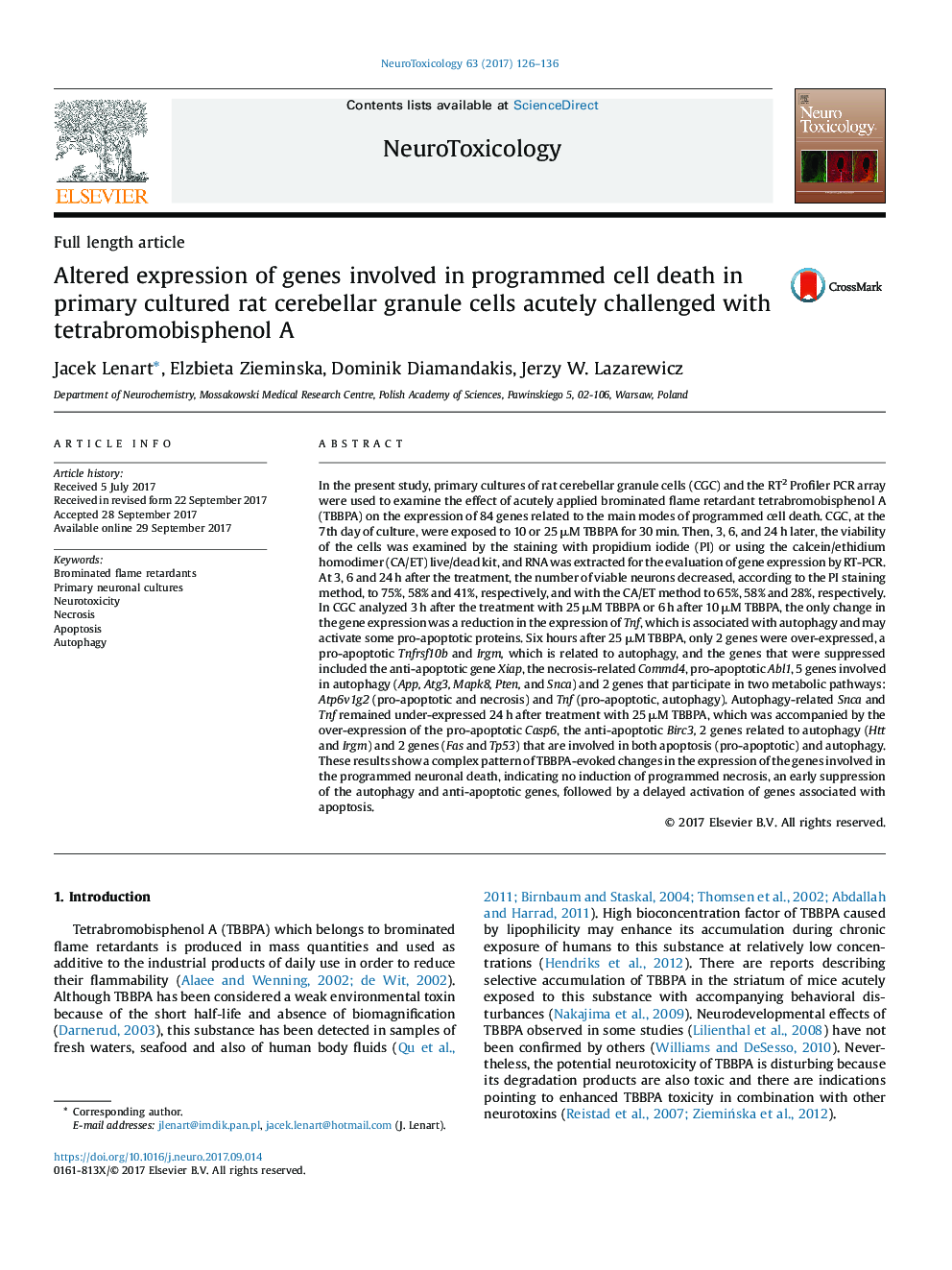| کد مقاله | کد نشریه | سال انتشار | مقاله انگلیسی | نسخه تمام متن |
|---|---|---|---|---|
| 5560772 | 1562031 | 2017 | 11 صفحه PDF | دانلود رایگان |

- The viability of primary CGC continuously declines after acute challenge with TBBPA.
- Genes related to programmed necrosis are not induced in CGC by TBBPA.
- Early suppression by TBBPA of the autophagy and apoptotic genes in CGC.
- Delayed activation in TBBPA-treated CGC of genes associated with apoptosis.
In the present study, primary cultures of rat cerebellar granule cells (CGC) and the RT2 Profiler PCR array were used to examine the effect of acutely applied brominated flame retardant tetrabromobisphenol A (TBBPA) on the expression of 84 genes related to the main modes of programmed cell death. CGC, at the 7th day of culture, were exposed to 10 or 25 μM TBBPA for 30 min. Then, 3, 6, and 24 h later, the viability of the cells was examined by the staining with propidium iodide (PI) or using the calcein/ethidium homodimer (CA/ET) live/dead kit, and RNA was extracted for the evaluation of gene expression by RT-PCR. At 3, 6 and 24 h after the treatment, the number of viable neurons decreased, according to the PI staining method, to 75%, 58% and 41%, respectively, and with the CA/ET method to 65%, 58% and 28%, respectively. In CGC analyzed 3 h after the treatment with 25 μM TBBPA or 6 h after 10 μM TBBPA, the only change in the gene expression was a reduction in the expression of Tnf, which is associated with autophagy and may activate some pro-apoptotic proteins. Six hours after 25 μM TBBPA, only 2 genes were over-expressed, a pro-apoptotic Tnfrsf10b and Irgm, which is related to autophagy, and the genes that were suppressed included the anti-apoptotic gene Xiap, the necrosis-related Commd4, pro-apoptotic Abl1, 5 genes involved in autophagy (App, Atg3, Mapk8, Pten, and Snca) and 2 genes that participate in two metabolic pathways: Atp6v1g2 (pro-apoptotic and necrosis) and Tnf (pro-apoptotic, autophagy). Autophagy-related Snca and Tnf remained under-expressed 24 h after treatment with 25 μM TBBPA, which was accompanied by the over-expression of the pro-apoptotic Casp6, the anti-apoptotic Birc3, 2 genes related to autophagy (Htt and Irgm) and 2 genes (Fas and Tp53) that are involved in both apoptosis (pro-apoptotic) and autophagy. These results show a complex pattern of TBBPA-evoked changes in the expression of the genes involved in the programmed neuronal death, indicating no induction of programmed necrosis, an early suppression of the autophagy and anti-apoptotic genes, followed by a delayed activation of genes associated with apoptosis.
Journal: NeuroToxicology - Volume 63, December 2017, Pages 126-136